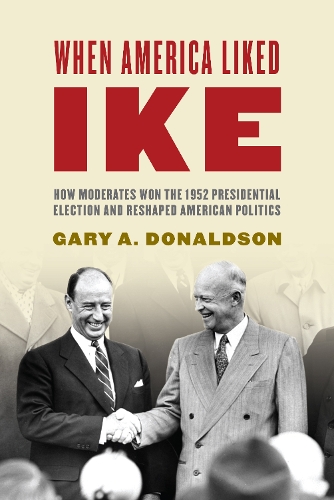
When America Liked Ike: How Moderates Won the 1952 Presidential Election and Reshaped American Politics
(Hardback)
Publishing Details
When America Liked Ike: How Moderates Won the 1952 Presidential Election and Reshaped American Politics
By (Author) Gary A. Donaldson
Bloomsbury Publishing PLC
Rowman & Littlefield Publishers
3rd November 2016
United States
Classifications
General
Non Fiction
Central / national / federal government
Elections and referenda / suffrage
324.73
Physical Properties
Hardback
146
Width 159mm, Height 236mm, Spine 17mm
390g
Description
The 2016 election cycle put in sharp relief the rifts that divide, and threaten to destroy, the Republican Party. While some claim these divisions originated in Nixons Southern Strategy or in Newt Gingrichs tenure as Minority Whip, Gary Donaldson argues that the conflict has its origins much earlier, at least as far back as the 1952 presidential election. That election pitted the conservative wing of the Republican Party (the Right Wing, the Old Guard, what is now the Tea Party) against the Republican moderates, represented by Dwight D. Eisenhower. Set against the backdrop of the Korean War and escalating cold war tensions, the 1952 presidential campaign culminated in Eisenhowers landslide victory over Adlai Stevenson. The election exposed deep internal divisions on the left and the right, but especially within the Republican Party. This book will prove an invaluable resource to readers, students, and scholars interested in rooting out the origins of our contemporary political landscape, on the right and the left.
Reviews
Donaldson, chair of American history at Xavier University of Louisiana, reveals that though the election of 1952 may not have deeply altered American politics, it was a harbinger of things to come. Faced with his own declining political fortunes, Harry Truman declined to seek re-election. The Democrats nominated Adlai Stevenson, headed for the first of his two defeats at the hands of popular military figure Dwight D. 'Ike' Eisenhower. But it was Ikes Republican Party that showed the first sign of the division that remains to this day. Its nominating convention was a brawlthe first covered on televisionbetween Ikes moderates and Robert Tafts conservatives. Even though Ike won that battle and the subsequent general election in a landslide, his partys fracture never healed. By 1964 the partys rightist elements, under Barry Goldwater, had captured the GOP. Donaldsons work is brisk and readable, though it breaks no new ground, and he accepts the consensus view that although Ike accepted much of the New Deal, that period of American history ended with his election. Whats more, as Donaldson shows, a new age of American politicsbrittle, hyperpartisan, and played out on televisionhad opened. * Publishers Weekly *
Donaldsons book offers a useful starting point for anyone wishing to look back at some of todays political trends in their earlier and generally more innocent forms. * Survival: Global Politics and Strategy *
"Donaldsons account of the election itself is exciting and readable. Because of its brevity and straightforward, jargon-free prose, this is an analysis appropriate for both general readers and college/university history and political science courses." -- Anthony O. Edmonds, George and Frances Ball Distinguished Professor of History, Emeritus, Ball State University
Author Bio
Gary A. Donaldson (PhD, LSU) is the Keller Foundation Chair in American History at Xavier University of Louisiana in New Orleans. He is the author of numerous books on American political and diplomatic history, including The First Modern Campaign: Kennedy, Nixon, and the Election of 1960, Liberalism's Last Hurrah: The Presidential Campaign of 1964, Truman Defeats Dewey, and America at War since 1945. He is currently completing a biography of Dwight D. Eisenhower.
